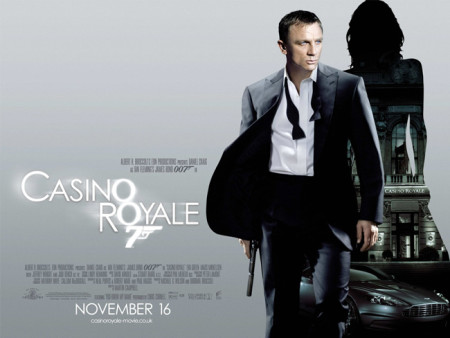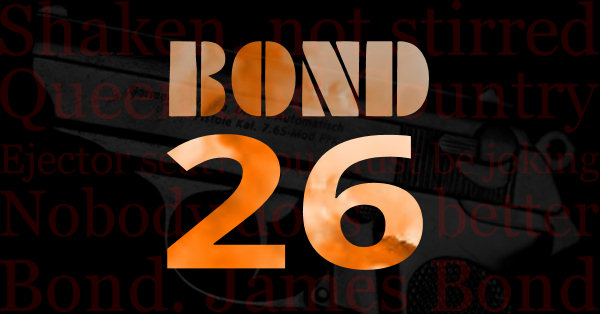Beyond the great dosage of espionage, death and violence that conforms it, Casino Royale is essentially a love story, and not in the corny way of the word.

Not in vain, one of the novel’s chapters (and the book’s tagline) was titled “A whisper of love, a whisper of hate”. And throughout the 2006 film adaptation directed by Martin Campbell, the hero played by Daniel Craig for the first time faces strong currents of love and hate.
The love story that defines Casino Royale is the romance between James Bond and Vesper Lynd.
James Bond, code number 007 recently promoted to the 00 section, is assigned to beat one Le Chiffre –banker of the world’s greatest terrorists– on a poker table. The man has been playing with this client’s funds and aims to recover the amount he lost in one of the phases of the poker tournament.
The mission seems simple: Bond, known for his gambler abilities, must bet against him and clean him out. Their bosses will terminate him if he loses. Throughout the mission, a woman appears: Vesper Lynd. She’s the HM Treasury officer delivering the money to bet against Le Chiffre.
Unlike the Ian Fleming conception of Vesper Lynd as a 1950s type of woman, conservative and modest, the character played by Eva Green in the 2006 film introduced us to a self-confident girl, who challenges James Bond with her business-like coldness and takes a big disliking at his arrogance: “There’s not enough space for you and your ego,” she tells him after boarding the empty hotel elevator right after the agent blows his cover name.
Hints of occasional affection show up as 007 comforts the now broken Vesper Lynd under the hotel shower, right after she witnesses Bond brutally choking an assailant (Le Chiffre’s client Obanno). The movie leaves it very clear how the girl is important to 007’s mission right after she refuses to refund him more money to keep playing against Le Chiffre after bluff misjudgment of Bond makes him lose all his money.
Bond gets staked by his CIA “brother” Felix Leiter, wins the game, and is captured with Vesper after a quiet dinner. He brutally tortures Bond to get the money back, but is soon surprised and shot death by Mr White (one of his organization’s leaders). As he recovers from torture, Vesper starts to warm up to Bond. In the following scenes the duo is seen lying on a beach, kissing, giving love declarations to each other and planning a future together. 007 resigns to his job to have a love life with the girl.
The story ends in tragedy when Vesper Lynd commits suicide after Bond learns she had been working for the enemy in exchange of her kidnapped boyfriend’s life. 007 chases her trough their vacational Venice after discovering she withdrew the casino winnings and is attempting to deliver it to Mr White’s people. Vesper locks herself in an elevator of a sinking floating Venetian residence under construction and drowns herself. We later learn that she made a deal to give them the money in exchange to save Bond’s life.
Casino Royale is the base of James Bond’s human side and the actual villains scheme isn’t as important as the things Bond experiences in love and pain. The main story even closes by the half of the film and there are considerable moments of love until the tragic end.
Bond starts the story by disliking women to get along the line of duty. Then, after the torment suffered and his recovery he softens his human side. He opens his heart, or “throws his armour away” as expressed on the movie and ends up in anguish as the girl dies, letting his emotions shove and keeping his mind cold to the job in hand.
“The bitch is dead”, he mutters. An insult directed more to the circumstances than to the “bitch” herself, because he let his emotions and love for Vesper to overrun the job in hand.
The subsequent Ian Fleming novels left Bond’s emotions apart by having SMERSH as the enemy in but mainly dealing with the villains scheme (pirate treasure smuggling in Live and Let Die, or the bombing of England in Moonraker), and even though there are some references to Vesper in Diamonds Are Forever as he avoids the song “La Vie en Rose” that reminds him of her and in On Her Majesty’s Secret Service when he visits her grave, Bond is not particularly seeking revenge or trying to fill his affective void.
However, the Daniel Craig era is indirectly James Bond’s road to fulfill his debt with love and to find his “solace”. Casino Royale starts with his first love interest and subsequent deception and SPECTRE closes the story with a triumphalist and somewhat happy ending.
The follow ups to the 2006 film were sequels where Bond’s past and emotions are a key part of the plot: Quantum of Solace sees the spy against Mr White and Vesper’s “kidnapped” boyfriend Yusef Kabira, Skyfall avoided the story-arc but focused on Bond’s maternal relationship with Judi Dench’s M and SPECTRE once again brought back his damaged feelings as he deals with the man behind “all his pain” (no other than the rebooted arch-villain Ernst Stavro Blofeld) and leaves it all for an –apparently– happy life with Madeleine Swann.
Casino Royale may be described as a story where a part of the mankind’s fate is played in a casino table. A story filled of thrills, violence and betrayals.
But in the end, what describes Casino Royale the most is that it is the story of how James Bond found true love and tragically lost it.
Nicolás Suszczyk is editor of The GoldenEye Dossier and Bond en Argentina.










